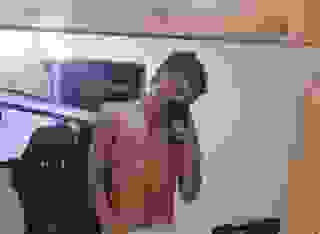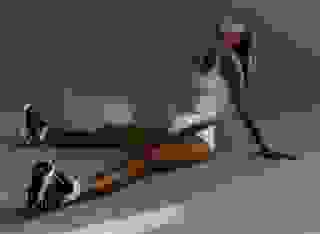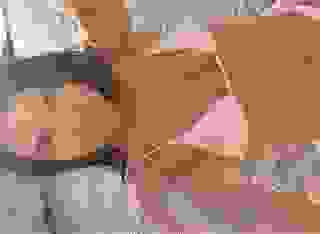Note: You can change font size, font face, and turn on dark mode by clicking the "A" icon tab in the Story Info Box.
You can temporarily switch back to a Classic Literotica® experience during our ongoing public Beta testing. Please consider leaving feedback on issues you experience or suggest improvements.
Click hereI couldn't tear my eyes from her direction to notice David's expression. I presumed that when David saw her last, she didn't appear quite like that.
Her eyes narrowed as she held onto the chair arm to steady herself. She spoke as harshly as her frailty would allow, "Yes? What do you want?" Her rough, phlegmy voice had a familiar thick Southern American drawl.
"Hello, Teresa, I don't know if you remember me, but I'm David, and you've not met this-"
"David?" She wheezed her words like an asthmatic with pneumonia. "You mean the skinny queer boy who went to school with my son, Zachariah."
Confused, I turned to David. "Zachariah?"
"I named him Zachariah." She suppressed a cough, but I still detected the indignation pouring from her. "He foolishly named himself Pearce." She glared at David. "What do you want?"
"May we come in?" he asked. "We bring news of your son."
She acquiesced with a wave of her hand.
The delightful space contained grand ceilings and a bedroom up a spiral staircase. Teresa didn't use the loft as her bed made a spectacle of the living room. A large photo in a shiny, well-polished frame of an attractive young woman with a handsome man sat in prominence at her bedside.
In the details, I found the apartment charming, but her presence marred the attraction. She had left a thick residue from decades of her habit on every wall and surface; the evidence was visible ten feet away. Looking about, I knew I didn't want to sit--or stay for that matter. To my relief, her accent, a remainder of her former life, survived unaccompanied by the graceful Southern hospitality that guests would find in my home. She neither offered us a seat nor anything to drink, indicating we should keep it short.
She took a drag from her pipe. "You think I don't know," she said before David could speak.
His brows rose in curiosity. "I don't know. Do you?"
With every word, a cough rose in her chest, and from her palpable stubbornness, she refused to give in to it. "I knew you were coming. You will tell me Zachariah won't come back."
"Perhaps," I said. "Who told you we were coming?"
"Never you mind." A fit of wheezing forced a few choking coughs. She then reclined in the ruddy-looking travesty she sat upon. "Did he find his father?"
"His father?" asked David. "I don't know. Why?"
"I made a grave mistake with Zachariah."
"Yes, he told me John wasn't his father," said David.
At the mention of his name, she slipped into reverie. She closed her eyes and placed a bony hand on her face. "John," she whispered in the anguish of a treasured memory. "I couldn't tell," she said, opening her eyes. "The boy looked like me, but I hoped John was his father. I wanted to believe it so badly that when Zachariah assumed it, I had no desire to tell him otherwise."
Witnessing her body struggle to force a series of shallow coughs grew difficult for me; I wanted to help her. Her lungs, somewhat unobstructed for the moment, had allowed her to speak.
"He thought of you as his family," she said to David, whispering. "He loved you like a brother. He seemed content with that so long as he believed his father had died. I made the mistake of telling him the truth. Afterward, you weren't enough, and he never loved me." She sank into a fit of coughing that made a rattle in her lungs. "As Zachariah grew older," she continued, "I realized that John wasn't his father. He reminded me too much of the other one." She sneered. "I told him the truth, and in his anger, he did terrible things to get me to name him." She took a drag from her pipe, and smoke emanated from her mouth as she whispered. "He made me tell him. I hoped that once he knew he would leave and free me of the thing, John helped me escape by bringing me here. Zachariah became a daily reminder of his father, and I wanted nothing to do with him. He finally left when you did."
"That doesn't sound like the man I knew at all."
"You didn't know him," she said, once more suppressing a cough. "He showed you what he wanted you to see; his father was the same. Once I had married him, he showed me his true self. He could be quite cruel, and so could Zachariah."
David squatted by her chair. "Who was his father?"
She coughed a deep and unproductive cough that told me she wouldn't last.
"You'll have never heard of him," she said, dismissing the question with a wave of her bony hand. "His father was Jackson Scott, a cruel, ruthless bastard."
"Senator Jackson Scott?" I asked.
"Senator?" She repeated, her eyes perking up for a moment, she then shook her head. "It shouldn't surprise me. He just talked about running for the Senate when I knew him, but he won't stop there. He would sell his mother's ashes for more power." She took another drag from her pipe.
The smoke had gotten to me. I wanted to leave, but David took the time to tell her all that had happened, everything from the betrayal and Pearce's own family to the NP device that he had taken from the temple. Teresa expressed no amazement, and when David finished, she said something portentous.
She gripped the chair arm and leaned forward, motioning for David to come closer, and she had an ominous tone. Her breath, shallow and ragged, she spoke with a flutter in her chest. "Don't trust what you think you know of him. What you've told me says your dealings with him aren't over."
"Why?" asked David.
"It changes everything. Besides himself, Pearce cared only about you, but you've rejected him as a traitor. He will resent you just as he resents me. There's nothing to stop him from telling them everything now, and they will destroy this place."
"But you live here, and you're his mother," I said.
She looked up at me and laughed a mirthless laugh, shaking her head. It induced a coughing fit lasting several minutes.
She touched David's hand. "Read them, seven and eight. You know what I mean. Read them, and you too will know." She coughed for a minute with little success. "Get out. Go, both of you," she said when she could speak again. "I want to die alone."
David and I took the sudden prompting and exited the apartment. We moved to the end of the hall to escape the poisonous cloud emanating from the crack of the door. We gazed through the transparent leaded glass window into the square for a few minutes while David mulled over what we had heard.
"Shouldn't we get medical help for her?" I asked.
"No, of course not," he replied.
"But she's ill and dying. It's what we would do on Earth. Why would we do less here?"
"You heard her, Rick, she wants to die alone. I know this seems harsh to you. You grew up in a culture that's made people afraid of death their whole lives, thereby creating all those religious busybodies with an expectation of their presence. We prefer to respect people's wishes. She wants to die alone."
"Some people don't always say what they mean or mean what they say," I said.
"Then she picked the wrong planet to die."
I looked at him --my face pinched with concern. I tipped my head, almost pleading with him.
David gestured to Teresa's door. "If you won't take her at her word, be my guest and find out for yourself. Pardon me, while I wait here."
I had to try. I hadn't gotten any feelings from Teresa that made me doubt her sincerity. I just felt I should try to help, if by no other means than offering her my assistance. I would have asked before we left, but she summarily threw us out. David was often right, and I thought even then I had set myself up for a telling-off.
Diving back into the vaporous stench, I found myself at her door once again. I almost knocked when I heard a crash inside. I opened the door uninvited, bold as brass, to find Teresa prostrate upon the floor struggling to breathe with her broken pipe next to her. I yelled for David and hurried to her. I turned her over and cradled her head. She tried to speak, and with difficulty, I deciphered what she said just before her struggle ended, "I hope Jesus can find me." As a Southern woman far from Earth, that worry must have weighed heavily on her mind. David rushed to my side in an instant. He knew Teresa dying in my arms would overwhelm me. I placed her head gently on the floor, and David held me while I cried.
When I had regained my composure, I took the sheet from the bed and covered the body. David contacted the people responsible for bodily remains and then proceeded to rifle through Teresa's apartment.
"David! Must you do that?"
"Yes," said David, searching through an old desk, shuffling around papers, and maneuvering around oversized coffee table books. "Besides, she had no relatives here."
I stood there watching him. "This woman is not even cold!"
"If your concern is a mere matter of propriety, I assure you, I'm not in pursuit of choice pickings."
"Then what do you think you'll find?"
He stopped for a moment to think. "I wonder if this apartment has storage. As for the object of my search," he said to me, "Teresa may have said she wanted nothing to do with Pearce, but she was his mother. Also, as you pointed out, not everyone always means what they say. She kept his things; I know the desk used to belong to him, as well as everything inside it."
"She had her bed down here," I said. "Perhaps, she used the loft as storage."
Dozens of containers lay stacked against the wall there, and many scattered about on the floor. "Somebody has dug around up here," I said, picking up a box. "Ugh! Smoke grime has covered the lid."
Discovering the same thing, David sniffed his hand. "Someone unstacked these jears ago."
"What do you think you'll find?"
"She told me to read seven and eight," said David. "She meant Pearce's journals. For jears, he had this notion he would write them, and one day they would find their way into the archive along with all the other writings. He carried one everywhere. He may yet get his wish, though perhaps not for honorable reasons. I think someone else has searched for them also."
While David and I dug through the containers, I made an inquiry. "Okay, I must know, what the hell was Teresa smoking? It smelled nothing like tobacco."
"She smoked the leaves of an alkaloid plant native to the planet," said David. "They grow wild here; we wouldn't cultivate such things. She inhaled the fumes to feed her recurrent narcotic habit."
"Narcotic habit? I thought the Foundational Enhancement would prevent such a thing."
"It won't do everything, Rick."
"Oh, well, who gave her the stuff?"
"No one, I should think," said David.
"Then how did a frail woman like Teresa get it?"
He paused a moment. "Sorry," said David, as he continued his search, "I'm making a distinction between giving and bringing. I can almost guarantee no one gave it to her. However, Venn will bring you whatever you want, or need, if you make a specific enough request. I found them!" He pulled one from the box and leafed through it.
Jiyū's equivalent to thick, black leather-bound journals lay within the container, and despite the environment to which his mother subjected the box's exterior, they remained in good condition.
"I see books one through seven," said David, "but someone has taken number eight."
"Perhaps, Pearce took it with him," I said. "Maybe, whoever else searched for them found it missing too."
David shook his head. "I wouldn't think so. Teresa must have read them, and that opportunity wouldn't arise until Pearce had left. I think whoever unstacked these boxes has the journal."
"Who else knew of them? Who might want them?"
"They weren't a secret," said David. "Anyone could know of Pearce's journaling; As I said, he carried one everywhere. But I can't imagine who else would bother with them."
David searched the end of book seven, and Pearce completed it not long after his mother made her confession about his father. For Pearce, that seemed a pivotal moment. David brought the open box of journals with us, but we waited for the mortuary service before we left.
We opened the balcony door for the fresh air and waited in the hallway by the open door of the apartment. They sent only one serviceman. He stood my height with meticulously coiffed, toffee blonde hair, and wore the appropriate dark suit. He pulled a levitating gurney behind him.
As the man came into view at the end of the hallway, David whispered, "Oh no."
"What's wrong?"
"Stay on your guard," said David, whispering to me. "This man excels as an intelligent, crafty devil."
"Well, do my eyes deceive me, or have I the honor of standing in the presence of the Ambassador to Earth, David Levitt? This pleases me," the man said as he neared us. In his voice, I heard the same Jiyūvian accent as David's. It blended a mixture of several accents but chiefly a variant of the Received Pronunciation British. He stopped short when the stench grew more pungent. I noticed he resisted the temptation to hold his nose. I suspected he meant to avoid appearing unattractive. "Ugh, horrid smell," he said. "I knew she wouldn't last once she started again."
"Hello, Neal," said David, emphasizing considerable disdain. "Please meet my mate, Rick. Rick, this is Neal." He spoke his name with unconcealed antipathy. "Well, is this what you do now?"
Undaunted by David's apparent dislike of him, he pressed on. "Several of us take it in turn, but I requested it for Teresa as she had remained a client of mine for many jears." Neal turned to me. "As you might imagine, the rarity of having to perform this job; it gives everyone involved time for other things."
Neal, a comfortable and flamboyant man whose mode of speech expressed itself in fluency and flourishes, gestured with his head and eyes as much as he did with his hands, like an overblown thespian.
"You used the word again," I said. "Had Teresa quit smoking? How long had she stopped?"
"Yes," he said, "she quit again for a time, but she didn't abstain long enough. Everyone said it would kill her one day."
David eyed Neal with cautious curiosity. "I will regret this, but would you happen to have heard anything about Pearce in recent days?"
"You mean gossip?" he asked in feigned shock, a hand to his throat. "I thought you didn't stoop to that sort of tawdriness. I believe you spoke those exact words to me 61 jears ago."
"Yes, point taken. I apologize," said David. "Right now, gossip or not, we need information."
Neal drew near with his pointer finger like a metronome in a shaming fashion. He stood before David, he cracked his knuckles and held his fingers together, beaming with a sly smile of pure delight. I couldn't tell which made him happier, gossiping with David or witnessing what Neal viewed as David's condescension in descending from the heights to mingle among the common folk. He lured us into the apartment, and I closed the door behind us. He glanced down into the box David held. He selected one of the books, looked at it, and smiled. He spoke by drawing out his words, savoring them, as he milked every second of the moment. "Yes, these ears of mine have heard things --some not new, some just this morning. Pearce's name is on some important lips, and so is yours. They speak of the past, the present, and the future, all of which they say comes at a price."
"Price?" I asked. "Jiyū doesn't have money."
"On Jiyū, nothing is more valuable than information," said Neal, smooth as silk. "So, no one pays the price in cash." He looked deeply into David, and his tone oozed the sound of portents and omens. "But sometimes, they pay the price with lives...and sometimes, in stains upon one's honor impossible to wash away."
"Must you do this?" asked David. "We have the pressing matter of the drones to attend to. I asked you a simple question; you can drop the Oracle of Delphi shtick. If you know something, spit it out."
He replied in a singsong voice, sliding the book he held through his fingers corner to corner like a box of cards. "You will want this, so indulge me."
David began growling, so I put my hand on his arm to keep him from tearing into Neal, and I spoke up, "What's David's price?"
David glanced at me and back to Neal.
Neal nodded in my direction and winked at David. "He's the smart one, isn't he? As you know, David" --Neal continued fingered the journal in his hands-- "I like secrets. I especially like those secrets not kept from me. The price is you must tell me everything you discover about Aurum's secret, which, apparently, is now Amaré's secret."
"Aurum's secret is a legend," said David.
"Who's Aurum?" I asked.
David set the box on the table next to us and drew his sword. "Aurum was Prime 159," said David, "that's four Prime's ago. He designed these Trust swords and made the gold sword Amaré carries now, as his sword. He also invented the Sharing. He made the gold cup used in the initiation ceremony, and he took it as his crest, placing it on the pommel. Through his efforts, he finalized the polishing of Jiyū into a shining light of civility and harmony from the structure established by the ancestors."
"You are so naïve," said Neal. "It may have started that way, but we have grown quite dull over the centuries if you bother to look beneath the surface."
David glowered at him. "If such a secret exists, it has nothing to do with us. So, if you want that information, you'll have to get it on your own." David sheathed his sword and snatched the box from the table.
Neal displayed the spine of the book in his hand, embossed with a gold number 7. "Looking for number eight, are you?"
"What do you know of it?" David asked.
"I, also, want number eight," he said. "A reliable source told me that Pearce didn't take it with him, so I came here to borrow it while Teresa slept in oblivion from the drugs, but someone beat me to it."
"How long ago?" asked David.
"Oh, 36 jears," he said.
"Why would someone take it?" I asked.
"It held knowledge they wanted to keep hidden." He dropped the seventh back into the box. "Pearce didn't merely journal in these tomes, the older he became, the more he turned them into a kind of exposé of his times. He filled them with information that many people would not want others to know. Only a few people know the nature of the material they contain."
"Who gave you that gossip?" David asked.
"It isn't gossip; I've read these." --David scowled-- "Don't give me that look; I brought them back, didn't I? Read them yourself, David. Trust me on this; you'll want number eight as well."
"This is a lot to read. With the drone situation, I don't know that we can spare the time," said David in contrived disinterest, "I intended to drop these off at the archive. I doubt it has anything to do with our current circumstance anyway."
"I understand," Neal said in a patronizing tone, "and you still don't have enhanced memory, do you? Well, this is important, so I'll give you this one for free. For whatever else you may think of me, David, I hope you do know where my loyalties truly lie." He brushed the front of his suit. "Does the word 'Sancy' mean anything to you?"
David and I both indicated it didn't.
"What is it?" asked David.
"I don't know," he said. "I've attempted to ascertain that since I read it. It has something to do with the portal. That I'm aware, no one on Jiyū calls themselves Sancy, and nothing here by that name exists, so I conclude it comes from someone or something on Earth, and I won't go there."
"Right. Anything else?" asked David.
"Did you know Pearce wrote about you a great deal?" asked Neal. "I got the distinct impression he loved you."
"Teresa said Pearce loved David like a brother," I said.
"Teresa was a pious Southern American homophobe and a hypocrite," said Neal. "So, she would prefer to see it that way. If she had believed anything else, David would never have seen her son again.








